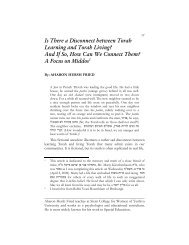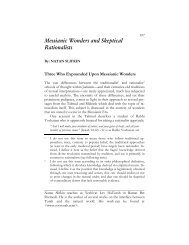Avraham and Sarah in Provence - Hakirah
Avraham and Sarah in Provence - Hakirah
Avraham and Sarah in Provence - Hakirah
You also want an ePaper? Increase the reach of your titles
YUMPU automatically turns print PDFs into web optimized ePapers that Google loves.
<strong>Avraham</strong> <strong>and</strong> <strong>Sarah</strong> <strong>in</strong> <strong>Provence</strong> : 241<br />
fected chomer that aids the perfected tzurah. Ralbag similarly states<br />
(Misheli, ibid.), “This book closes with the description of the chomer<br />
that serves the <strong>in</strong>tellect with such efficiency that it enables it to acquire<br />
completeness <strong>and</strong> it is allegorized as a female as always.” The<br />
Midrash (Yalkut, ibid.) expla<strong>in</strong>s, “A woman of valor – this is <strong>Sarah</strong>, as<br />
it is written, ‘for now I know that you are a woman of beauty’ 84 …<br />
‘the heart of her husb<strong>and</strong> is secure <strong>in</strong> her’ [is alluded to <strong>in</strong>] ‘that I be<br />
treated well for your sake’ <strong>and</strong> ‘booty will not be miss<strong>in</strong>g’ refers to<br />
<strong>Avraham</strong>, as it says, ‘<strong>and</strong> <strong>Avraham</strong> was very heavy with possessions’<br />
<strong>and</strong> ‘she caused for him only good <strong>and</strong> no evil’ [alludes to] ‘<strong>and</strong><br />
<strong>Avraham</strong> was treated well for her sake.’” Rambam would undoubtedly<br />
underst<strong>and</strong> this Midrash to be equat<strong>in</strong>g the chomer hamesukan with<br />
<strong>Sarah</strong> who supports her husb<strong>and</strong> <strong>Avraham</strong> <strong>in</strong> his struggle for perfection.<br />
This Midrash, <strong>in</strong> fact, forces us to look at the verses it quotes 85<br />
relat<strong>in</strong>g to <strong>Avraham</strong> <strong>and</strong> <strong>Sarah</strong> <strong>in</strong> an allegorical fashion. Follow<strong>in</strong>g<br />
Rambam’s approach, there is no question that Chazal <strong>in</strong>tended us to<br />
explore the allegorical mean<strong>in</strong>gs of <strong>Avraham</strong> <strong>and</strong> <strong>Sarah</strong>.<br />
Rashi, on the other h<strong>and</strong>, consistent with his approach, speaks of<br />
the allegorical mean<strong>in</strong>g of the eishes chayil as referr<strong>in</strong>g to the Torah.<br />
The Midrash, <strong>in</strong>deed, does make the equation as well, but only with<br />
one l<strong>in</strong>e “Eishes Chayil—this is the Torah.” Rashi produces his own<br />
commentary to expla<strong>in</strong> the allegorical relationship. Rashi really sees<br />
no “symbolic” 86 identification between woman <strong>and</strong> Torah, but it is<br />
merely that woman is used to allegorize the idea—a type of poetic<br />
cod<strong>in</strong>g. The stray<strong>in</strong>g woman st<strong>and</strong>s for ideas <strong>and</strong> knowledge that is<br />
foreign to the Torah 87 <strong>and</strong> the loyal wife is the wisdom of the Torah.<br />
Accord<strong>in</strong>g to Rambam, this particular midrash probably means that<br />
the “chayil” element is produced <strong>in</strong> woman via the Torah—the chomer<br />
has been transformed by <strong>in</strong>fus<strong>in</strong>g it with the values of the Torah. 88<br />
There are ramifications to these two disparate explanations, as we will<br />
see later. But even immediately we should note, that accord<strong>in</strong>g to<br />
Rambam, the chomer provides the spirit’s physical needs, while accord<strong>in</strong>g<br />
to Rashi—<strong>and</strong> the many who have followed <strong>and</strong> exp<strong>and</strong>ed upon<br />
84 See Bereishis 12 for all the allusions to <strong>Avraham</strong> <strong>and</strong> <strong>Sarah</strong>.<br />
85 And we have only quoted a few of the many found there.<br />
86 See the Jungian explanation to “symbolism” given above.<br />
87 Avodah zarah or m<strong>in</strong>us.<br />
88 The הב לושמי אוהו has been atta<strong>in</strong>ed.
















